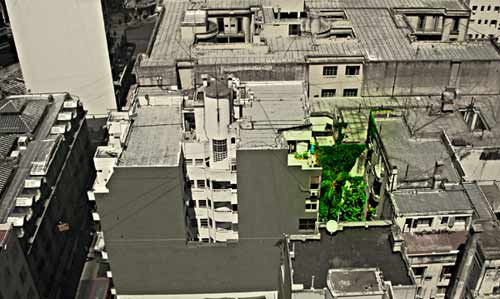While I spent most of my youth on a farm, I was actually born in the city. My parents decided in the late seventies to move to the country. As much as they found a great property — roughly a square mile in size, several natural springs, old growth forests as well as maintained agricultural land, direct access to a large fresh water body, and so on — it was the wrong time to buy and it resulted in an almost crippling amount of debt. While we did run an active farm, we did have other income as well and without it would have lost the farm.
Let me explain what was going on, as its representative of world systems.
Interests rates were down, so people were considering that they might have the credit for larger loans than they might not otherwise have access to. Loan officers convinced small (and at the time, successful) farmers that within a few years produce prices would be way up per bushel, and due to new farming technology, production would also be increased per acre. Armed with these numbers, they showed accounting charts that “proved” to these small farmers that they would be able to pay off the outrageous loans required to pay for the new land and equipment.
The end result of this was that small farmers were split into four income brackets, with the top income bracket purchasing the property of the three below as they “cashed out” and either retired or became rental farmers. So in simple terms, the same amount of land was being farmed, but the property was collectively owned by less people. As it turned out, produce prices did not go up as expected, and while new technology did increase yield per acre somewhat, it had its own costs and while less employees were needed under the new system using big equipment, actual profit per acre often went down.
These farmers were not able to pay back the large loans they'd accepted due to the numbers the banks floated in front of them never coming to fruition. A majority of these medium sized farmers defaulted on their loans, and the banks took control of their properties, selling them in bulk to farming corporations who took over the farm management. The farmers either left the community to seek just-scraping-by work in the city or accepted rental farming or farming as a direct employee of the factory farms.
Once again land had passed from a larger group of owners to a smaller group of owners. The land was still being used for farming, as it had for the last two hundred years, and the land was as rich and productive as it always had been. Never once had the land betrayed man in its gifts, but instead of those gifts being spread evenly and used for the betterment of the community, financial tricks and deception transferred that collective wealth into the hands of a very small number of people. Not only that, but instead of the profits of the farm going back into the community, it moved to centralized corporate coffers where it allowed bankers to repeat and escalate this financial piracy.
I'm very certain that many of you reading this have experienced it on a smaller level with the slavery that comes with a crappy job and credit card bills — “interest” is the brightest deception ever played by the rich on the poor. Because of it, poor people have to pay significant percentages of their income to the rich, simply because they have less money. How does that make sense? The economic system is, by design, intended to transfer wealth upward, keep it there, and keep those at the bottom producing without earning.
On a larger level, this happens internationally as well. Agents of large countries and international development corporations (construction, oil, and so on) enter smaller countries that are still developing and convince them that gigantic construction projects — hydroelectric dams and power infrastructures, highways, nuclear plants, and so on. They get showed the exact same type of accounting that the farmers are shown — “If you buy this, look at how much profit you'll have; you need to modernize!”
The obvious catch is that these little countries don't have the money (or companies or experience) to build these things. Luckily the construction giants selling the projects help them get loans from allied groups of lenders. As with the small farmers, these countries default on their loans, making them the “property” of the first world lenders and corporations. Again we see assets that were evenly spread out among the people being taken away from them and concentrated into increasingly small groups that have less and less personal connection to the assets involved.
At the same time, that country's profits actually do go up, but at the cost of the masses, just like while farming profit per farm has gone up, the money made by the average person working those farms has dropped to a fraction of what it once was, and the income made by the average citizen of that duped nation plummets.
I'm not going to talk about terrorism and unhappiness and the effects thereof — that should be obvious. But what is important to understand is that we're not just seeing wealth being concentrated in the “best” farmers or countries. We're seeing wealth concentrated in the most ruthless and profit-oriented ventures. In the farming world, that's resulted in factory farms choosing to create massive pollution and environmental destruction because it's slightly more profitable, to say nothing of the torturous animal abuse they engage in. They even break the law when the cost of resultant fines is lower than the profits caused by the violation. It's extremely rare for small farmers to farm in this manner, first because it's not effective until you're operating on a very large scale, and second, because they have an ethical and personal connection to their land and just don't have the heart to behave like that.
The same type of profit-above-all-else violations occur in the big game as well. For example, the oil pipelines across Ecuador have so far leaked twice as much oil into the rain forest as was in the Exxon Valdez crash and more leaks every day, leaving toxic deserts in place of forest and making river waters poisonous to consume. Because the government put itself in deep and defaulted debt, it can't raise any objection, and besides, the right officials are being paid handsomely for their complicity. The only resistance comes from “terrorists” (often small indigenous farmers), the last bastions of liberty left in much of the world.
If you've read this far, I hope you think very seriously about why Bush is bankrupting the US government. In a few days the debt ceiling will have to be raised again, and his proposed budget for the next year adds yet another trillion dollars worth of debt. As the US dollar plummets and loses its international buying power, the US people and the US government become utterly beholden to their bankers as the debt hole reaches unrecoverable debts. Who are these bankers? If you've followed the links I've posted here regularly, you know that these bankers are represented by the neo-con cartel that surround Bush.
Again, these are individuals who are willing to break the law in exchange for profit. That's not a secret. Here in Canada (and I imagine elsewhere also), it's even written into our tax code — a corporation must break the law if it increases profits, and may write off and tax deduct all fines and legal costs incurred as legitimate costs of doing business. Some of the laws they break kill hundreds of thousands of people, and have certainly thrown hundreds of millions into poverty. Do you really think that staging 9/11 or rigging the US election in order to gain control of the US population through debt is out of character?

“Life will find a way” – Arthur C. Clarke



Post a Comment